#battle of aspern essling
Explore tagged Tumblr posts
Text
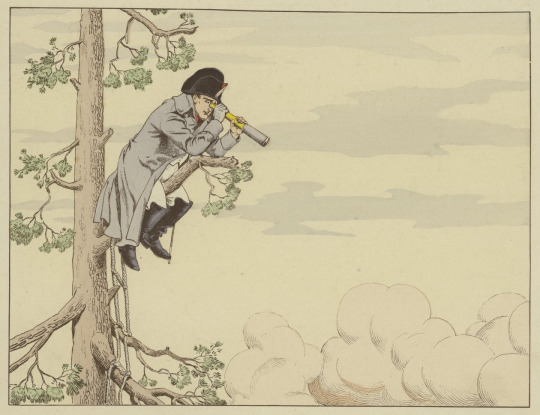
Napoleon observes the Battle of Aspern-Essling from the top of a tree on the Island of Lobau, 22 May 1809
by Jacques Onfroy de Bréville
#jacques onfroy de bréville#job#art#napoléon#napoleon#emperor#napoleon bonaparte#napoléon bonaparte#telescope#telescopes#napoleonic wars#battle of essling#battle of aspern essling#lobau#island#napoleonic#france#french#french empire#first french empire#europe#european#history
132 notes
·
View notes
Text
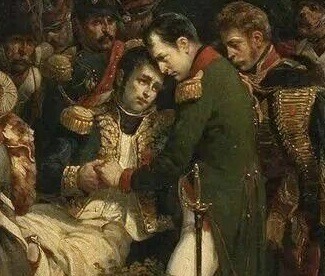
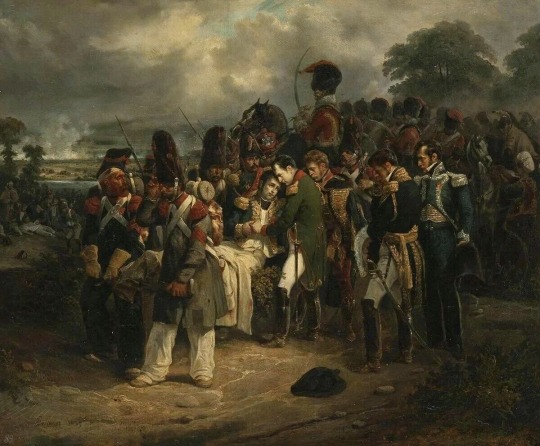
This pic makes me sob
#Lannes#marshal Lannes#Jean Lannes#Napoleon#napoleon bonaparte#napoleonic#napoleonic era#first french empire#19th century#french empire#france#history#Bonaparte#Napoleon’s marshals#art#military history#historical art#battle of aspern-essling#aspern-essling#war of the 5th coalition#5th coalition#napoleonic wars#painting#portrait#1800s#1800s art#19th century art#battle
79 notes
·
View notes
Text

General Saint Hilaire before the battle of Aspern-Essling
18 notes
·
View notes
Text
Bessières and the 600,000+ Franc Question
For @josefavomjaaga
While going over sources and material related to Jean-Baptiste Bessières, there's one thing that keeps twigging my journalist Spidey sense, and I don't like that.
Always, without fail, it's presented as a fait accompli that Bessières blew anywhere between 600,000 to one million francs on his mistress, a Paris opera dancer named Virginie. The fact he had a mistress isn't actually unusual by itself, when compared to the affairs his peers carried on. The exceptions were probably the Davouts and the Lefebvres.
Furthermore, his wife, Marie-Jeanne, discovered the affair after his death when his personal affects were returned to her from the battlefield.
The massive debts the Marshal left behind bankrupted his family, necessitating that Marie-Jeanne into selling their estate, Chateau de Grignon, to cover some of it. Napoleon also paid down some of Bessières' debts and set up a yearly pension for Marie-Jeanne her son. According to some accounts, she struggled financially for the rest of her life.
This is what I don't like about it, and why it doesn't completely pass the sniff test.
I accept that Bessières died flat broke and in debt. In debt to whom, however? Who were his creditors?
When did he meet his mistress? Was that fortune spent over a period of years, or in a fairly short time?
Even as a Marshal of France he had to pay his officers out of his own pocket, and provide his own carriages and some supplies on campaign. If he was flat broke, how did he continue to pay his officers?
Bessières was also bad with money to begin with. He was known to be generous and charitable, to the point where he'd be giving away money to anyone whom he thought was more in need than he was with it. Allegedly, Virginie was in debt herself, and he paid down all of them out of the apparent goodness of his heart.
(This raises even more questions. Was she a gold digger, was she blackmailing him, was he totally besotted with her that he didn't realize what the hell he was doing? Was he just lonely? Did they have genuine feelings for one another? There's a lot of there there, but no real answers.)
My conclusion is, no, Bessières did not spend 600,000 to one million francs on his mistress. Her presence, however, was not helpful to his situation.
He paid down Virginie's debts, however much they were. Being terrible with money, he kept putting himself in a financial hole, and then he kept digging. The upkeep on Chateau de Grignon had to be ridiculous. He still had to pay his officers and his staff. He was probably borrowing and burning through money and racking up the debt. Like that meme goes, "This is fine" while everything's burning down around him. A bit like using a credit card to pay down a credit card, as one might do in the modern parlance.
(His financial problems may have contributed to his increasing depression towards the end of his life as well. Was someone blackmailing him with his debts? Another interesting question that can never be adequately addressed.)
From what I've gathered, he hid all his problems from pretty much everyone. Even Napoleon seemed caught off guard with how bad Bessières' finances were. I argue that the 600,000 to one million francs he owed upon his death were cumulative and not to a single person as the historical narrative wants people to believe.
It seems a small thing to be annoyed with, but there seems to be more than a bit of misogyny to lay all of Bessières' troubles on a single woman as the historical narrative seems to want to do.
Another thing ... if Bessières burned a lot of his recent correspondence towards the end of his life, what exactly was the evidence Marie-Jeanne discovered as proof of the affair. How did she prove it? Did other people know about the affair and kept her in the dark? If so, who was that?
In the novel, "The Battle" by Patrick Rimbaud, a semi-fictionalized account of the Battle of Aspern-Essling, Rimbaud's characterization of Bessières has him wear two gold lockets under his Marshal's uniform. One for Marie-Jeanne, the other for Virginie. I don't know if Rimbaud based that on an actual account, or if it was something he made up. I have a lot of problems with that book though, probably because the translation seems somewhat robotic and not great. It's an interesting idea, however, and maybe worth keeping around as a headcanon.
Did Madame Bessières struggle financially for the rest of her life afterwards? Possibly. I don't have enough information to make a conclusion there, but it's not impossible. She did continue to faithfully visit his tomb for years after his death.
TL;DR Bessières died broke and in debt but it wasn't all because of his mistress. If someone else has something to the contrary, I'd love to read it.
#in my headcanon#the other locket has Murat's portrait in it#now wouldn't that be trippy for people to find#jean baptiste bessières#napoleon's marshals#my old journalism professor would have an apoplexy reading some of these historical accounts#they fail the basic how what when why where test#napoleonic era
51 notes
·
View notes
Text

Aftermath of the battle of Aspern Essling
#illustration#artwork#art#napoleonic era#napoleonic wars#aquarelle#jean lannes#marshal lannes#marshalate#original art#history art#napoleon
77 notes
·
View notes
Photo
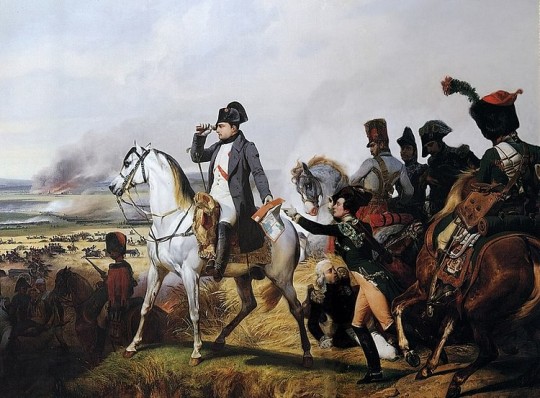
Battle of Wagram
The Battle of Wagram (5-6 July 1809) was one of the largest and bloodiest battles of the Napoleonic Wars (1803-1815). It resulted in a pyrrhic victory for French Emperor Napoleon I (r. 1804-1814; 1815) whose army crossed the Danube River to defeat Archduke Charles' Austrian army. Wagram ultimately allowed Napoleon to win the War of the Fifth Coalition (1809).
Background
Ever since its defeat at the Battle of Austerlitz (2 December 1805), the Austrian Empire itched to exact revenge upon Napoleon and recover its status as a major power in Central Europe. In the three years that followed the battle, Austria bided its time as its army was modernized by Archduke Charles, brother of the emperor and commander-in-chief of the Austrian forces. Charles' reforms included a system of mass conscription through the Landwehr militia and a reorganization of the army into nine line and two reserve corps, copying the corps d'armee system that had contributed to Napoleon's success.
By early 1809, hundreds of thousands of French soldiers were off in Iberia fighting the Peninsular War (1807-1814) against Spain and Portugal. This greatly reduced France's military presence in Germany, an opportunity that Austrian Emperor Francis I was keen to take advantage of. Francis ordered his brother to prepare for war, and on 10 April 1809, Archduke Charles sparked the War of the Fifth Coalition when he invaded France's ally of Bavaria with 200,000 men. Napoleon was prepared; having noticed the build-up of Austrian forces, the French emperor had raised a new Army of Germany that consisted mainly of French conscripts and allied German soldiers from the Confederation of the Rhine. Since Archduke Charles' invasion got off to a slow start, Napoleon was able to launch a rapid counteroffensive. In the ensuing Landshut campaign, Napoleon's Army of Germany won a string of battles and forced Archduke Charles back across the Danube. Charles' retreat left the road to Vienna wide open, and Napoleon occupied the Austrian capital on 13 May.
Emperor Francis had evacuated Vienna before the French occupation, and Archduke Charles had rallied his forces and was currently sitting on the opposite bank of the Danube. Since all the major bridges across the river had been destroyed, Napoleon needed to build his own. He chose the floodplain of Lobau Island, south of Vienna, as the ideal location for his river crossing. By midday on 20 May, the pontoon bridge was completed, and the first elements of the French army crossed over to occupy the towns of Aspern and Essling. By the next morning, Napoleon had gotten 25,000 troops across the river, but efforts to get the rest of his army across were frustrated by the Austrians, who floated flaming barges down the river to punch holes in the French bridge.
At 1 p.m. on 21 May, Archduke Charles ordered an attack. The French were surprised by the sudden Austrian assault, and brutal fighting erupted around Aspern and Essling that lasted well into the night, at which point the French retained control of both towns. The battle resumed on the morning of 22 May; while the Austrian wings were embroiled in the struggle for the towns, French Marshal Jean Lannes led a charge against the vulnerable Austrian center. His attack came close to success but was stopped by the personal intervention of Archduke Charles, who led a spirited counterattack. As the day wore on, the French were pushed out of Essling, and the bridge was repeatedly damaged, preventing Napoleon from getting the rest of his army across. At 3 p.m., the French emperor decided to cut his losses and ordered a withdrawal to Lobau. The Battle of Aspern-Essling marked Napoleon's first major defeat in a decade and had cost him between 20-23,000 casualties including the irreplaceable Marshal Lannes, who was mortally wounded. The Austrians also suffered around 23,000 casualties but achieved victory, having denied the river crossing to Napoleon.
Continue reading...
21 notes
·
View notes
Note
“I’ve read elsewhere that Fouché and Josephine were initially friends/allies, so I’m wondering when and why exactly their relationship started to go south [...]”
I’ve read that, too, and I’ve wondered the same. I could imagine it was when Josephine started to invite all those émigrés to come back. Fouché clearly was on the “left” of the political spectrum during the Consulate, Josephine (and her family) on the right. (I’ve read that she always remained a royalist at heart, even as an empress 😁.) All those returning émigrés had a bone to pick with the revolutionaries of old, of which Fouché was a rather prominent one. So maybe there were no intrigues necessary at all? Though I guess Fouché and Murat felt in a similar way about those émigrés (Thiard once mentions something to that effect, I believe), so they may have been allies in trying to stem in the flow?
“I’d rather read more details about this kind of stuff than more tedious play-by-plays of the battles by military historians any day”.
I would like to second that. And to third and fourth, too 😋.
But actually I wanted to add some brief snippets from Austrian books that, as I mentioned above, seem to hint at unrest or even conspiracies against Napoleon within the army during the campaign of 1809, and that mention Eugène (who, just for context, still was on his march from Italy at the time of Aspern-Essling). These things may point in a similar direction as Hortense’s story:
From Carl-Wilhelm Böttiger: “Die Weltgeschichte in Biographien”, Volume 7, 1843
[…] Soon after this battle [Aspern-Essling] it was also when Napoleon sank into that wondrous 36-hour sleep at Kaiser-Ebersdorf, and some already had the idea of proclaiming Eugen as emperor and delivering Napoleon dead or alive to the English in Fiume. It is known that several officers were shot around that time on the Schmelz [then a parade and drill ground] near Schönbrunn.
Napoleon sleeping - or being in a coma - for almost 36, sometimes only 24, sometimes even 48 hours, after Aspern-Essling is an Austrian legend that seems to have been already well-established in 1843, guessing from the casual way it is mentioned above. The fun part is that in the published correspondance there happens to actually be a marked lacune after the battle of Aspern-Essling… Mysteries… 😁
Franz-Anton Lubojatzky: “Der letzte deutsche Kaiser und seine Zeitgenossen” from 1860 has a longer account of the same desperation in the French army after Aspern-Essling:
The victor of the century was overcome, under the curses of his own soldiers, who now recognised him as a mere mortal, fleeing in a barge across the Danube to his headquarters at Kaiser-Ebersdorf. The human nature in him imperiously demanded its rights, a thirty-hour sleep bound him, who had given the command not to wake him.
Crushed by the fate of being defeated, facing the prospect of becoming prisoners by a second such defeat like the one just experienced at Aspern and Essling, his grand officers held secret meetings, and the plan was put forward, if Napoleon perished or was captured, to place his stepson, Viceroy Eugene de Beauharnais, at the head of the army in order to conclude a general peace and to lead the army back to France.
Many an accursal against the helplessly sleeping emperor flew from the lips of these enraged men, who longed for the happiness of living in the bosom of tranquillity and their families and of peacefully enjoying the fruits of their efforts.
He also repeats the idea of handing over Napoleon to the Brits in Fiume, which makes me believe his account is based on the one above.
At the root of all this may be a particular productive and not necessarily reliable author named Joseph Freiherr von Hormayr, who had helped organize the Tyrolean uprising during the same war and from that time on engaged in publishing lots of propaganda writings. In a book »Lebensbilder aus dem Befreiungskriege« from 1841, he gives a rather confused account of the anti-Napoleon conspiracies (for example, he claims that when the French army chased the British troops of Sir John Moore to La Coruna, some men had agreed to capture Napoleon, “who in his impatience showed up every other moment among the sentries” and to deliver him to the Brits for money – a somewhat difficult plan, considering that Napoleon was miles away from that corps and preparing his departure for France at the time - so whoever showed up at the sentries clearly was an impostor 😋). He even lists some names of people involved: a colonel Meriage, from Andréossy’s entourage, and his confidant Guesniard, the latter among those shot on the Schmelz. The only name I could verify was colonel Jacques Joseph Oudet, who was said to have ties to the Philadelphes conspiracy and who was killed at Wagram - “certainly not by an Austrian bullet”, as Hormayr says.
Hello! I was wondering if you’ve ever come across anything regarding Eugène’s relationship with Fouché? I was just browsing Hortense’s memoirs and she off-handedly mentions that Fouché disliked Eugène. It’s the first time I’ve seen either mentioned in regard to the other so now I’m curious. Here’s the excerpt; the “attempt” in question was when Friedrich Staps tried to murder Napoleon in 1809:
“The generals and other officers, shocked that such an attempt should have been made and alarmed at the idea of what might have happened, had considered seriously the situation arising from the absence of any direct heir to the imperial throne. They debated who might have been chosen as the Emperor’s successor had the attempt succeeded, and unanimously voted for the Viceroy. Public opinion throughout France indorsed the verdict. Rumors of this reached the Emperor and displeased him. They revived all his ideas concerning a divorce and later caused him to say to me during one of our conversations: “It became a necessity; public opinion demanded it.” I believe also that Fouché, with his skill for intrigue and dislike for my brother, took advantage of the episode to bring the matter of a divorce again to the Emperor’s attention. He perhaps even mentioned that my mother and I were deliberately engaged in promoting Eugène’s popularity.”
Hi, and thank you for the Ask! 💖
Of the top of my head, I could not point my finger to any particular interaction between the two, neither negative nor positive. Once Eugène was in Milan, while Fouché stayed in Paris, there was barely a chance for them to be at odds with each other, at least directly. And before that, Eugène simply had not had a high enough rank (officially) to be of much importance.
That Eugène was not fond of Fouché, especially after Fouché had tried to talk Josephine into a divorce in 1807, that I will believe. Josephine wrote to Eugène in detail about it. When Fouché in 1813/4 went on his mission to Italy, he not only saw Murat but also Eugène, and in his memoirs he (or whoever wrote in his name) claims that only after Fouché had explained it to him did Eugène understand that his future, too, was in jeopardy should Napoleon fall (which, I believe, is somewhat contradicted by Eugène's own correspondence with Auguste and their constant worries about the future of their children).
And then, during the second Restauration, Fouché, on the run and kicked out of France, asked Eugène for protection and an asylum in Bavaria. Which Eugène politely but very firmly declined. And that's rather unusual, for him.
As to the events Hortense relates in her memoirs, being the malicious person that I am I always read that a little differently 😊:
First of all, I assume it to be blown somewhat out of proportion, with Hortense trying to give Eugène more importance than he truly had. Though, in fairness, there are Austrian sources that point in the same direction, so something may really have gone on in the army (Napoleon's main base of support!). That there was a huge portion of dissatisfied men and officers ever since the Polish campaign, that much at least seems to be clear (the "Roi Nicolas" affair in Portugal, with several high-ranking officers either conspiring with the enemy or at least revolting against Soult, happens almost at the same time). It's possible that they (or some of them) picked Eugène as a rallying figure, as somebody who might bring some calm and restraint for the future.
And secondly, I always understood this to mean that Josephine and Hortense of course really had intrigued on Eugène's behalf and tried to win public support for the idea of Eugène as Napoleon's successor. Fouché had reported to Napoleon about it - as was his job! -, Napoleon had not taken it well (as was to be expected), and now Fouché was an enemy of Eugène's in the eyes of Josephine and Hortense 😁. (Napoleon did react badly to all signs of Eugène gaining a reputation of his own at this time, there's also Eugène's panicked reaction about a book someone had written about his campaign and that he had not managed to seize in time before it reached Paris. And as to Hortense and Josephine pushing Eugène into the limelight, there is another incident during the Russian campaign, when an account of the Battle of Malojaroslavetz praising Eugène and the Army of Italy to the sky "accidentally" found its way into a French newspaper...)
So, from the little evidence we have, I'd argue Fouché was rather Josephine's enemy, and only in extension that of Eugène (Eugène being designated as Napoleon's successor would of course have resolved the question of a divorce forever). If he acted in opposition to Eugène, it surely was in accordance with Napoleon's plans (which may or may not have coincided with Fouché's own).
As usual, I wish I had a better answer. But I'll pay attention from now on, maybe I come across some more actual interaction between the two in the future. Thanks again for the Ask!
#napoleonic era#Austria 1809#battle of aspern#Battle of Essling#Austrian conspiracy theories#philadelphes
42 notes
·
View notes
Text
On this Day: Vienna Congress Edition
October 10th, 1814
Political
N/A
Other
Archduke Charles, Alexander I, King Frederick William III, and Frederik VI, visit the site of the battle of Aspern-Essling.
a ball and souper is hosted by Prince Metternich that evening.
the Opera Moses is performed at Theater an der Wien. all sovereigns were present
5 notes
·
View notes
Text
Seven Men of Gascony
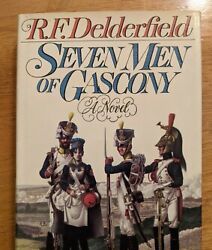
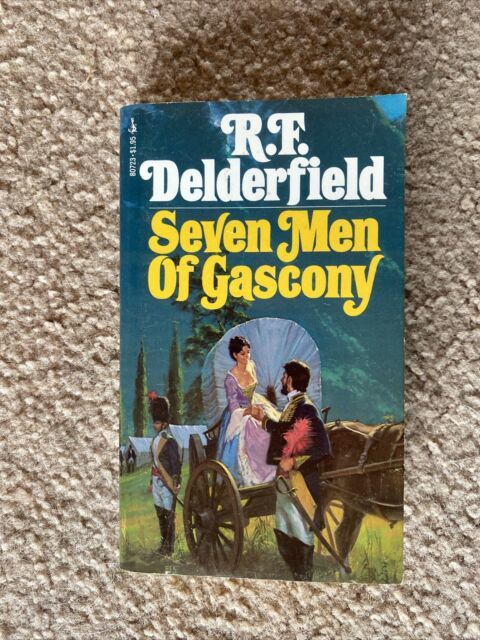
Just finished reading again Seven Men From Gascony. Long ago I had the hard back edition pictured at top, with the more historically accurate cover art. The copy I just read was a battered paperback edition. It is the story of seven soldiers of Napoleons army and a cantiniere woman they travel with. The story takes them the battle of Aspern essling in 1809 through the Penisular War then into Russia finially ending at Waterloo in 1815. It is an epic tale with great battle discriptions that shows the comradery and loyalty of men at war. They all begin as voltigiers, light infantry, with one eventually transfering to the cavalry. In the story one a grizled old veteran sergant leads the others, and manages to keep them alive, over time two of them marry the cantiniere, as one by one the soldiers are taken by the war. This is a Great book for anyone interested in the Napoleonic wars. R. F. Delderfield is a great storyteller. The novel has action, romance, warmth and passion, a damn good read!
10 notes
·
View notes
Text
Events 5.22 (before 1920)
192 – Dong Zhuo is assassinated by his adopted son Lü Bu. 760 – Fourteenth recorded perihelion passage of Halley's Comet. 853 – A Byzantine fleet sacks and destroys undefended Damietta in Egypt. 1176 – The Hashshashin (Assassins) attempt to assassinate Saladin near Aleppo. 1200 – King John of England and King Philip II of France sign the Treaty of Le Goulet. 1246 – Henry Raspe is elected anti-king of the Kingdom of Germany in opposition to Conrad IV. 1254 – Serbian King Stefan Uroš I and the Republic of Venice sign a peace treaty. 1370 – Brussels massacre: Between six and twenty Jews are murdered and the rest of the Jewish community is banished from Brussels, Belgium, for allegedly desecrating consecrated Host. 1377 – Pope Gregory XI issues five papal bulls to denounce the doctrines of English theologian John Wycliffe. 1455 – Start of the Wars of the Roses: At the First Battle of St Albans, Richard, Duke of York, defeats and captures King Henry VI of England. 1520 – The massacre at the festival of Tóxcatl takes place during the Fall of Tenochtitlan, resulting in turning the Aztecs against the Spanish. 1629 – Holy Roman Emperor Ferdinand II and Danish King Christian IV sign the Treaty of Lübeck ending Danish intervention in the Thirty Years' War. 1762 – Sweden and Prussia sign the Treaty of Hamburg. 1762 – Trevi Fountain is officially completed and inaugurated in Rome. 1766 – A large earthquake causes heavy damage and loss of life in Istanbul and the Marmara region. 1804 – The Lewis and Clark Expedition officially begins as the Corps of Discovery departs from St. Charles, Missouri. 1807 – A grand jury indicts former Vice President of the United States Aaron Burr on a charge of treason. 1809 – On the second and last day of the Battle of Aspern-Essling (near Vienna, Austria), Napoleon I is defeated in a major battle for the first time in his career, and repelled by an enemy army for the first time in a decade. 1816 – A mob in Littleport, Cambridgeshire, England, riots over high unemployment and rising grain costs, and the riots spread to Ely the next day. 1819 – SS Savannah leaves port at Savannah, Georgia, United States, on a voyage to become the first steamship to cross the Atlantic Ocean. 1826 – HMS Beagle departs on its first voyage. 1840 – The penal transportation of British convicts to the New South Wales colony is abolished. 1846 – The Associated Press is formed in New York City as a non-profit news cooperative. 1848 – Slavery is abolished in Martinique. 1849 – Future U.S. President Abraham Lincoln is issued a patent for an invention to lift boats, making him the only U.S. president to ever hold a patent. 1856 – Congressman Preston Brooks of South Carolina severely beats Senator Charles Sumner of Massachusetts with a cane in the hall of the United States Senate for a speech Sumner had made regarding Southerners and slavery. 1863 – American Civil War: Union forces begin the Siege of Port Hudson which lasts 48 days, the longest siege in U.S. military history. 1864 – American Civil War: After ten weeks, the Union Army's Red River Campaign ends in failure. 1866 – Oliver Winchester founded the Winchester Repeating Arms 1872 – Reconstruction Era: President Ulysses S. Grant signs the Amnesty Act into law, restoring full civil and political rights to all but about 500 Confederate sympathizers. 1874 – Verdi's Requiem was first performed at San Marco in Milan on the first anniversary of Manzoni's death. 1905 – The Sultan of the Ottoman Empire Abdul Hamid II establishes the Ullah millet for the Aromanians of the empire. For this reason, the Aromanian National Day is sometimes celebrated on this day, although most do so on May 23 instead, which is when this event was publicly announced. 1906 – The Wright brothers are granted U.S. patent number 821,393 for their "Flying-Machine". 1915 – Lassen Peak erupts with a powerful force, the only volcano besides Mount St. Helens to erupt in the contiguous U.S. during the 20th century.
0 notes
Text
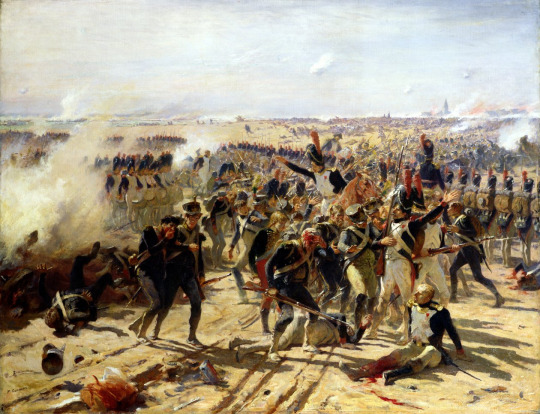
The Battle of Essling, May 1809 by Fernand Cormon
#battle of essling#art#fernand cormon#battle of aspern essling#napoleonic wars#austria#france#french#austrian#napoleonic#history#holy roman empire#europe#european#battlefield#french empire#austrian empire#soldiers
26 notes
·
View notes
Text
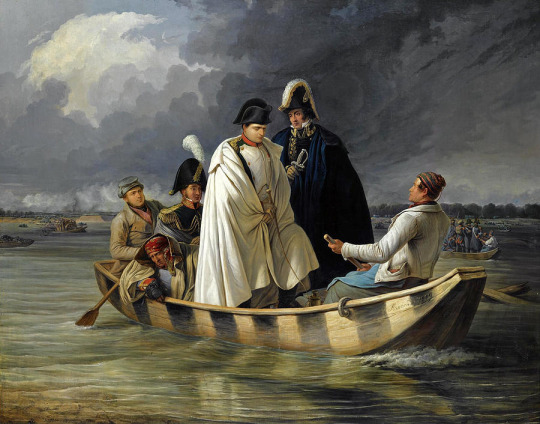
Napoleon being pretty and majestic during the War of the 5th Coalition. I like the guy behind him looking annoyed like he just got woken up from a nap.
#I’d take this over George Washington crossing the Delaware#Napoleon#Napoleon leaving the Lobau after the defeat at the Battle of Aspern#Anton Ritter von Perger#the artist was born in the same year as this event#Anton Perger#battle of aspen#aspern-essling#napoleonic era#napoleonic#France#perger#frev#Austria#french revolution#first french empire#19th century#1800s#history#napoleon bonaparte#french empire#Austrian empire#napoleonic wars#lobau#Vienna#art#painting#paintings
73 notes
·
View notes
Text
Napoleonic Wars Battle of Aspern-Essling Granary Building (15mm 3D Printed Model)

Napoleonic Wars Battle of Aspern-Essling Granary Building (15mm 3D Printed Model) NOTE: Figures and cart not included. Era: The Napoleonic Wars Description: This 3D Printed model represents an historically accurate facsimile at a scale that one can use for diorama making, model train railroad scenery, war gaming terrain, or creative projects. Quality: Before selling a 3D print, we make a series of test prints at different model scales to ensure quality, and print reliability. In addition, we print each 3D model using the same resin or PLA plastic brand every time for consistent and repeatable results. Scale: 15mm figure height (1:107 scale) Type: 3D Printed Models: unpainted 3D Printed models for you to customize and integrate into your wargame tables, model railroad displays or other artistic and creative projects. License: This is a licensed 3D Printed Model designed by 3D-Print-Terrain (www.3dprintterrain.de) all rights reserved. Read the full article
0 notes
Note
Answering @josefavomjaaga in the tags.
This is what I've put together from more than one source, although I admit this can still be wrong.
On the first day of battle, Bessie was following orders by holding the line around the empty space between the villages of Aspern and Essling and not charging into battle with the cavalry. I forget who was where, but Massena and Lannes' corps were in the villages on either side and were taking a vicious beating from the Austrians. Lannes repeatedly sent messages to Bessières to get off his ass and do something. Lannes, being Lannes, didn't hold back his opinions of Bessie in the messages. At some point, Bessières got pissed at all the shit he was getting and ordered the cavalry to charge, and they turned back the Austrians successfully.
That night, Lannes overheard Bessières trashing him to Masséna in the bivouac. Lannes trashed talked him back, and Bessières drew his sword on him first, demanding satisfaction -- a duel -- for being insulted repeatedly throughout the day.
Lannes was on the verge of accepting when Masséna stepped in and put a stop to it. Then Masséna walked off with Lannes to calm him down, which makes me wonder if Bessie held a grudge against Masséna from that point on that poisoned their working relationship in Spain several years later.
do you think Lannes could have won the duels that he challenged, or was he just talking shit? im surprised he didnt actually get in more duels
I have no clue whether Lannes would have won against Soult or Bessieres, had he been allowed to take them on. However, unless those two had taken fencing lessons and knew the finer points of swordsmanship--I do know that Lannes had not, much like d'Artagnan just down the road from him--his full frontal assault plus his general quickness might have taken them out eventually.
#jean lannes#jean baptiste bessières#andre masséna#napoleon's marshals#napoleonic wars#this is what i meant when i characterized Bessie as having one hell of a temper in my fics#push those buttons in just the right way#and lannes was all about pushing buttons#and this is what happens
34 notes
·
View notes
Photo




The mortally wounded Marshal Lannes meets Napoleon after the battle of Aspern-Essling, 22 May 1809, painting by Joseph Lois Hippolyte Bellange
You can read more about the battle here.
102 notes
·
View notes
Photo

Battle of Aspern-Essling
The Battle of Aspern-Essling (21-22 May 1809) was a major battle of the Napoleonic Wars (1803-1815). It saw an Austrian army under Archduke Charles defeat a French army led by Emperor Napoleon I (r. 1804-1814; 1815) as it attempted to cross the Danube River near Vienna. The battle marked Napoleon's first major defeat in ten years.
Continue reading...
28 notes
·
View notes